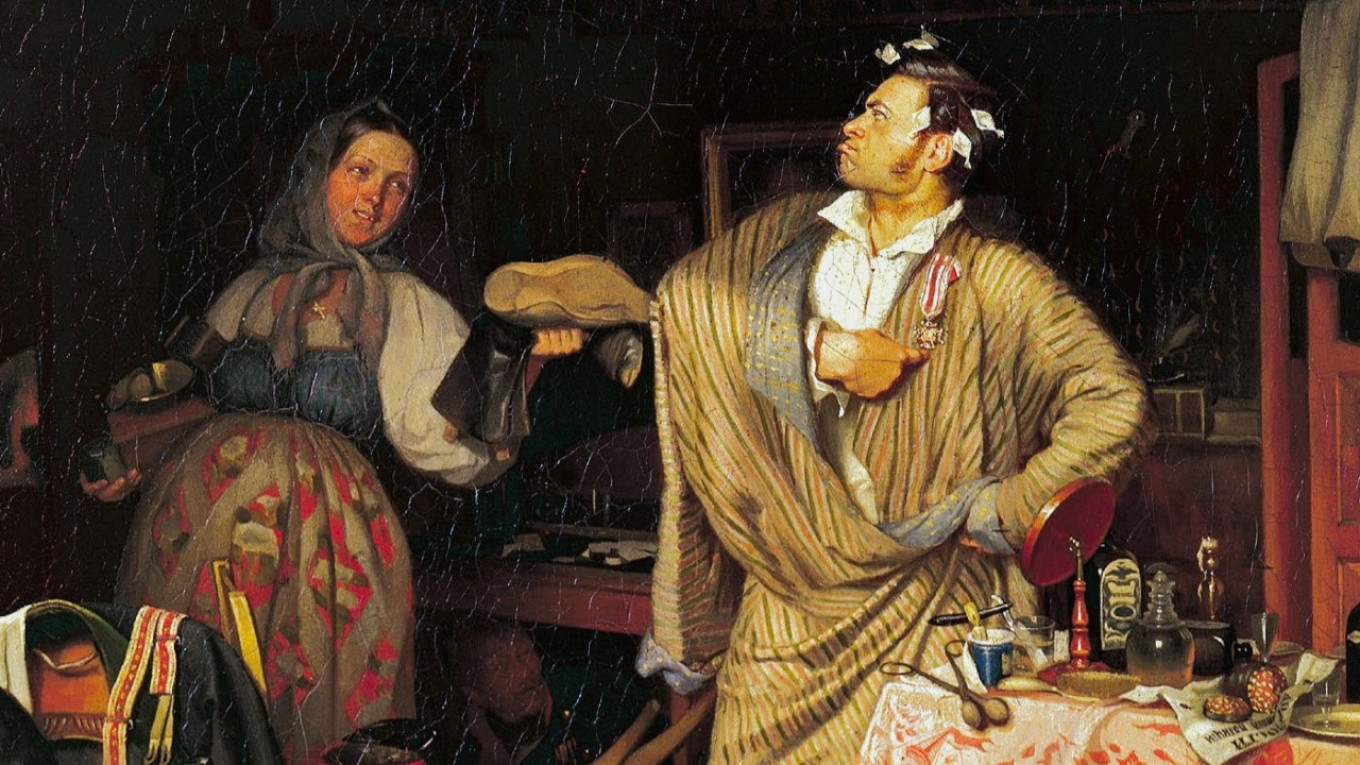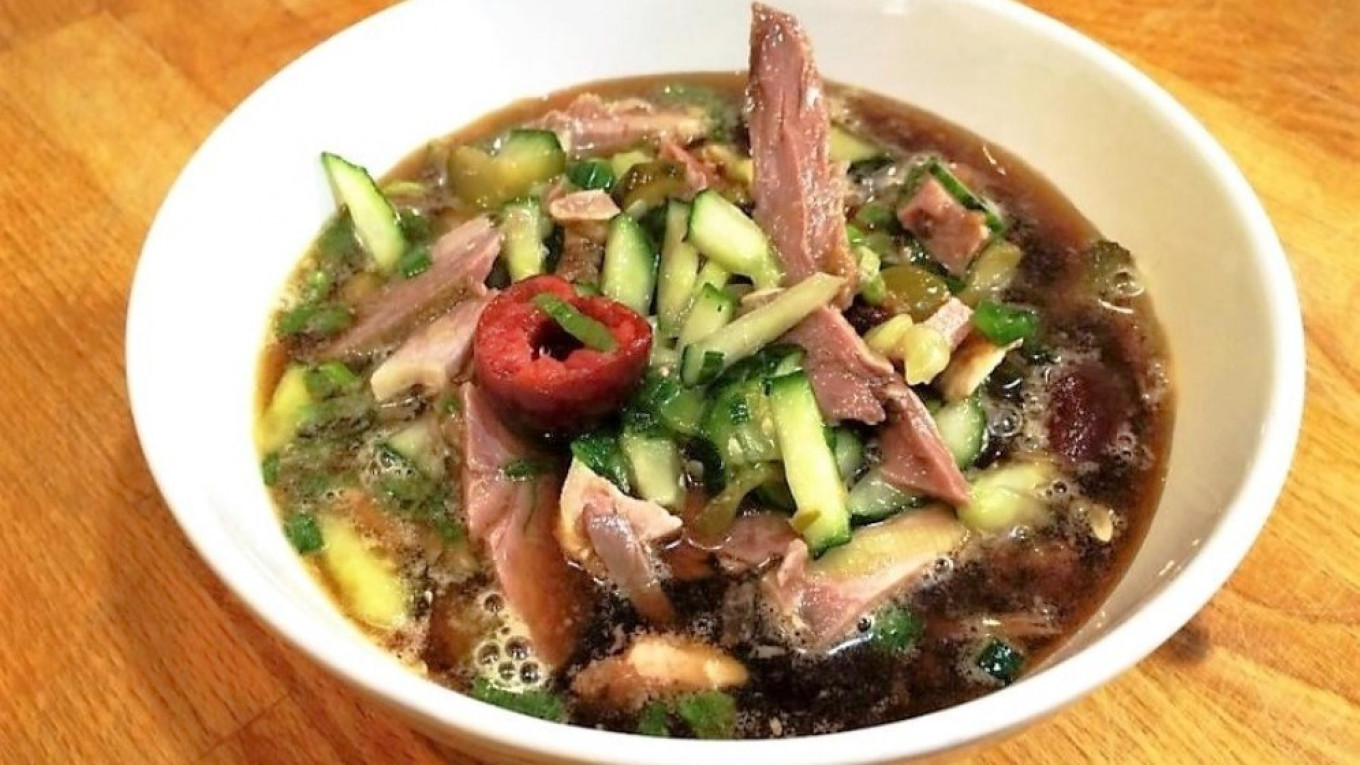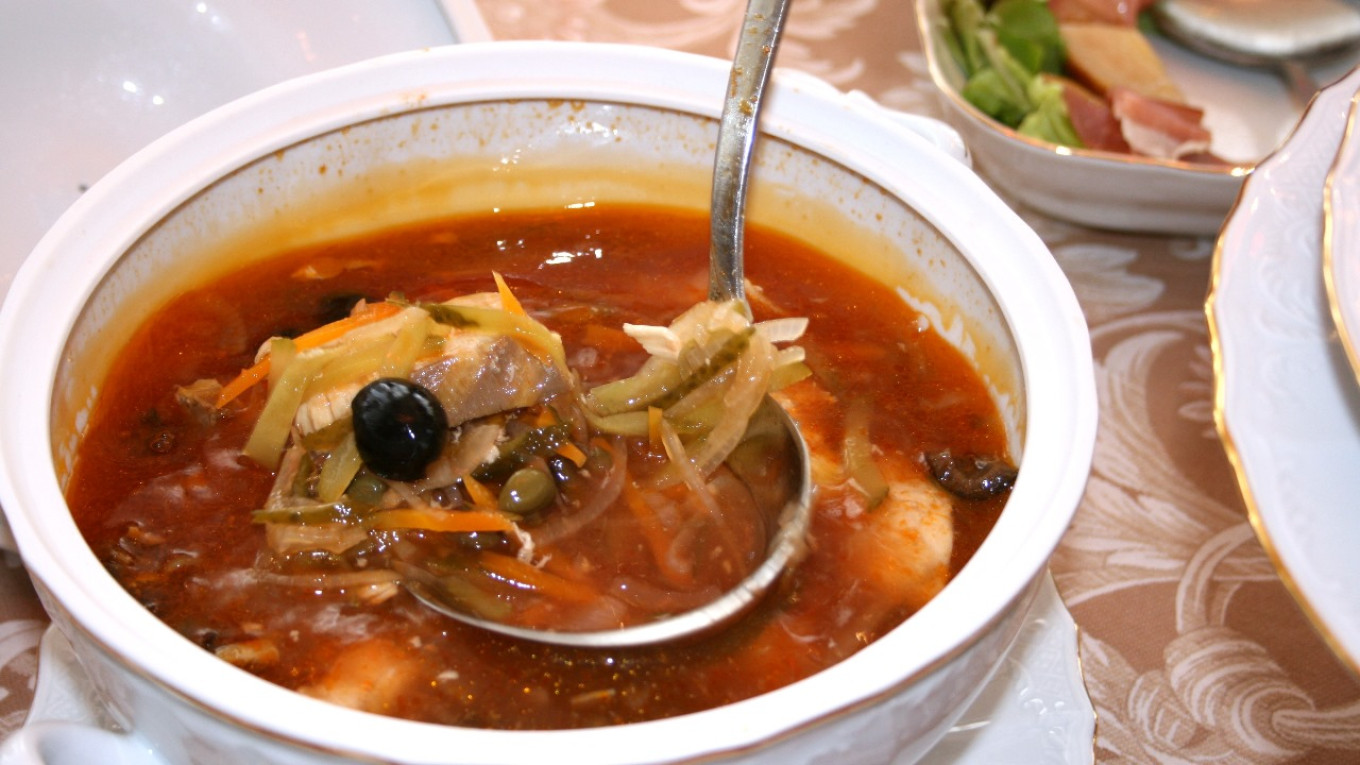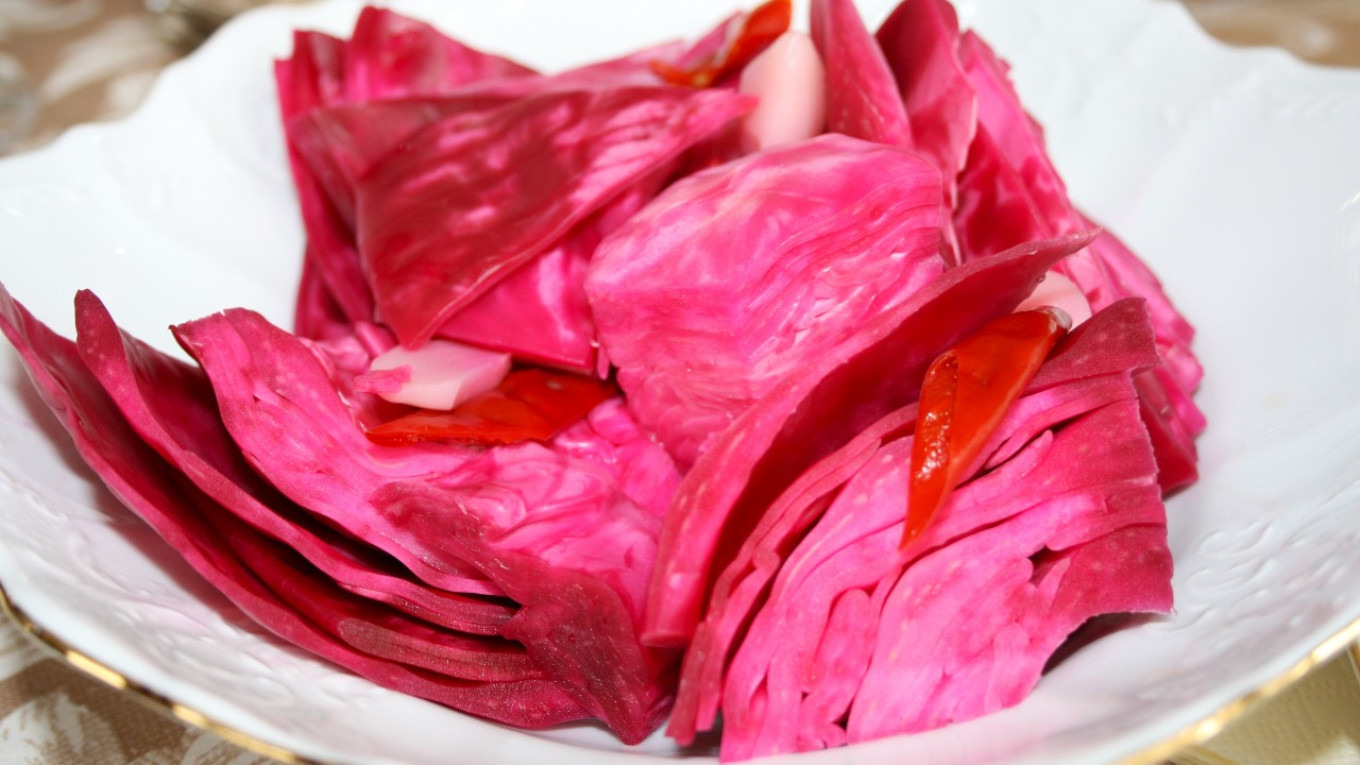Knowing how to Return to life after a holiday is an important part of Russian culinary culture. The caviar has been eaten and you’d rather die than look at the Salad Olivier let alone eat it. All that a Russian has left is his hangover. That must be taken care of somehow.
And so, just before New Year’s, we share some knowledge about this very important subject.
Having a hangover after a wild evening of fun is perhaps inevitable. But you can be prepared ahead of time to get rid of it by calling on the help of time-honored Russian culinary cures. The wisdom of the ancestors comes to our aid. After all, they didn’t have aspirin or activated charcoal, but all the same managed to come back to life.
"How do we get rid of or tame the headache that we call a hangover,” wrote Ivan Boltin in in 1788 in commentary to the "History of Russia" by Nicolas-Gabriel Le Clerc. “There are different ways to do this: some drink a glass of vodka to ease the pain. Others refresh themselves with cool drinks, that is, they have sour cabbage soup or drink lemonade, lingonberry water or pickle brine. The best remedy, in my opinion, is not to have a hangover in the first place — never get drunk.”
“Never get drunk" is unsolicited advice. And even in those years throwing down a glass of something alcoholic was not universally considered to be a good remedy for a hangover. The Latin proverb "similia similibus curantur" (“like is cured by like”) could definitely go too far.

The simplest "remedies" were the most common. At the top of the list is kvass — not sweetened kvass, but slightly sour kvass, the kind that is used when making the soup called okroshka. Sometimes it was made with horseradish, which made the drink extremely invigorating.
Kvass was also used as a cure by royalty. For example, Prince Golitsyn, who had been demoted to the position of jester, was called upon to bring the drink to Empress Anna Ioannovna (1693-1740), which gave him the nickname Kvasnik. After a heavy evening of drinking, a mug of kvass was as good a cure as a glass of pickle brine the morning after.
Another effective cure was so-called sour shchi. Don’t confuse this with shchi which is a soup made with sauerkraut. In old literature you read about "bottles with sour shchi," which are just bottles of a kind of kvass. It differed from regular kvass in that it was made with several types of malt and flour, including rye, wheat and buckwheat. This made for a carbonated tart kvass, sealed in bottles with a wire twisted cork.

The more sophisticated revelers prepared for the morning ordeal in advance. "Royalty and noblemen eat a great deal of roast meat and even more soups and chowders — no matter if it's only fish broth with bread fit to be poured on the ground — and they eat it with crushed garlic. As soon as they get too drunk and they feel the effects the next day, they prepare a dish they call “hangover”: cold, thinly sliced meat in kvass."
This was a quote from the memoirs of Jan Jansen Struys. In 1668 he was hired as a sailing master in Muscovy, a country little known in Europe, which was just creating the first seaworthy ships. He returned home in 1673 after crossing the whole of Russia from Novgorod to Astrakhan, witnessing Stepan Razin's uprising and even meeting the famous ataman in person. His memoirs are a very curious page in the history of our homeland.
How were these life-saving hangover soups made? They were both hot and cold. Here is what the famous Russian historian Nikolai Kostomarov (1817-1885) writes about the dish called "hangover": "These are shredded slices of cold mutton mixed with finely shredded cucumbers, cucumber brine, vinegar and pepper."

This was apparently a widespread habit. Balthazar Coyett, who worked at the Dutch embassy to Moscow (1675-1676), wrote: "Having drunk excessively, the next day they make themselves a special hangover dish of cold meat, thinly sliced, and their usual drink — kvass, cucumbers, vinegar, garlic and a mass of pepper. They eat this cold. Kvass, the favorite drink of the common people, is made of water with barley, oats and bran."
The soup called “hot hangover” is made with rich mutton broth with onions, pickles, carrots, lemon juice and a couple of spoons of grated horseradish.
Equally effective was "beef jelly, diluted with kvass and seasoned with grated horseradish and sour cream." This improvised soup-like dish combined the healing properties of kvass and the benefits of strong, gelled broth. Horseradish, pickles and radish intensified the effect.
And finally, the pinnacle of Russian "alcoholic cuisine" is solyanka, which we have described on these pages in the past. It began as pan-fried sauerkraut with meat, and then in the early 19th century was transformed into a tart, rich soup.

Elaborate, fanciful versions of solyanka appeared: with sturgeon, capers, lemon, and smoked meat. Every innkeeper used it as a showpiece for his talent and drew in customers with unimaginable tastes and smells.
But, as is often the case, not everyone worries about tomorrow. Solyanka is the ideal, but we offer a simpler solution: spicy pickled Georgian cabbage. This is simple, delicious food: “You’re not ashamed to serve it, and it would be a shame not to eat it.” The morning after a holiday is the perfect time to have it, along with a glass of something and a plate of leftover Salad Olivier. You’ll remember with gratitude sunny Georgia.
Georgian or Gurian Cabbage
Ingredients
- 3 kg (6.5 lb) cabbage
- 600 g (1 1/3 lb) beets
- 2-3 small hot peppers
- 2 heads garlic
- 200 g (7 oz) celery leaves
- 10 black peppercorns
- 2 bay leaves
Marinade
- 2 liters (2 quarts) water
- 3 Tbsp salt
- 150 g (2/3 c) sugar
- 185 ml (3/4 c + 2 tsp) 6% vinegar
Instructions
- Peel off the top cabbage leaves, cut the rest into large pieces, including the core if possible.
- Wash beets, peel and julienne or cut into thin slices.
- Peel garlic, clean the seeds out of the peppers and cut into rings.
- Put cabbage, beets, celery leaves and spices in layers in a jar or pot ending with a top layer of beets. Celery leaves provide the characteristic flavor of Gurian cabbage.
- Prepare the marinade. Boil water with sugar and salt. Pour off 170 ml (2/3 c) from the total amount of liquid and pour in 185 ml (3/4 c + 2 tsp) of 6% vinegar (vinegar can be added to taste later).
- Pour the hot marinade over the cabbage, beets and spices in the jar. Leave at room temperature.
- As the cabbage absorbs water (and this will happen without fail), add cold boiled water to the jar. After 3 days put the cabbage in the refrigerator. And on the fifth day you can serve cabbage as an appetizer or as a cure on the “morning after the night before.”

A Message from The Moscow Times:
Dear readers,
We are facing unprecedented challenges. Russia's Prosecutor General's Office has designated The Moscow Times as an "undesirable" organization, criminalizing our work and putting our staff at risk of prosecution. This follows our earlier unjust labeling as a "foreign agent."
These actions are direct attempts to silence independent journalism in Russia. The authorities claim our work "discredits the decisions of the Russian leadership." We see things differently: we strive to provide accurate, unbiased reporting on Russia.
We, the journalists of The Moscow Times, refuse to be silenced. But to continue our work, we need your help.
Your support, no matter how small, makes a world of difference. If you can, please support us monthly starting from just $2. It's quick to set up, and every contribution makes a significant impact.
By supporting The Moscow Times, you're defending open, independent journalism in the face of repression. Thank you for standing with us.
Remind me later.







